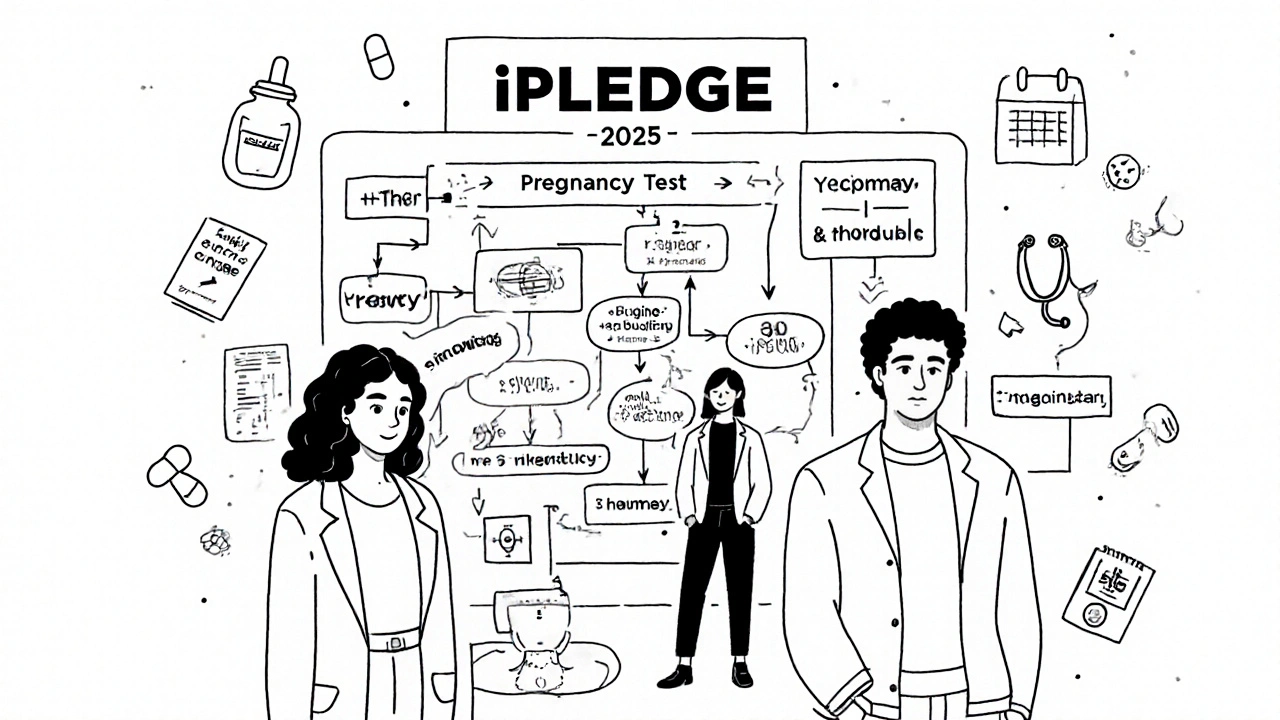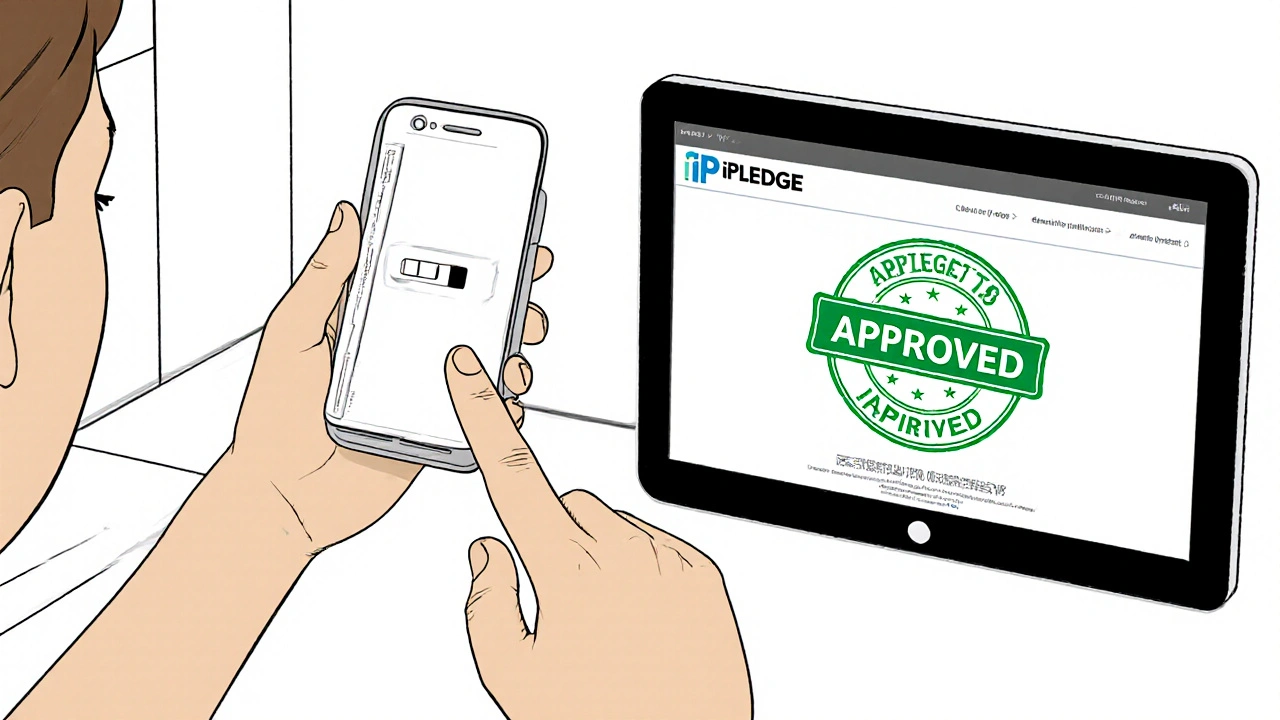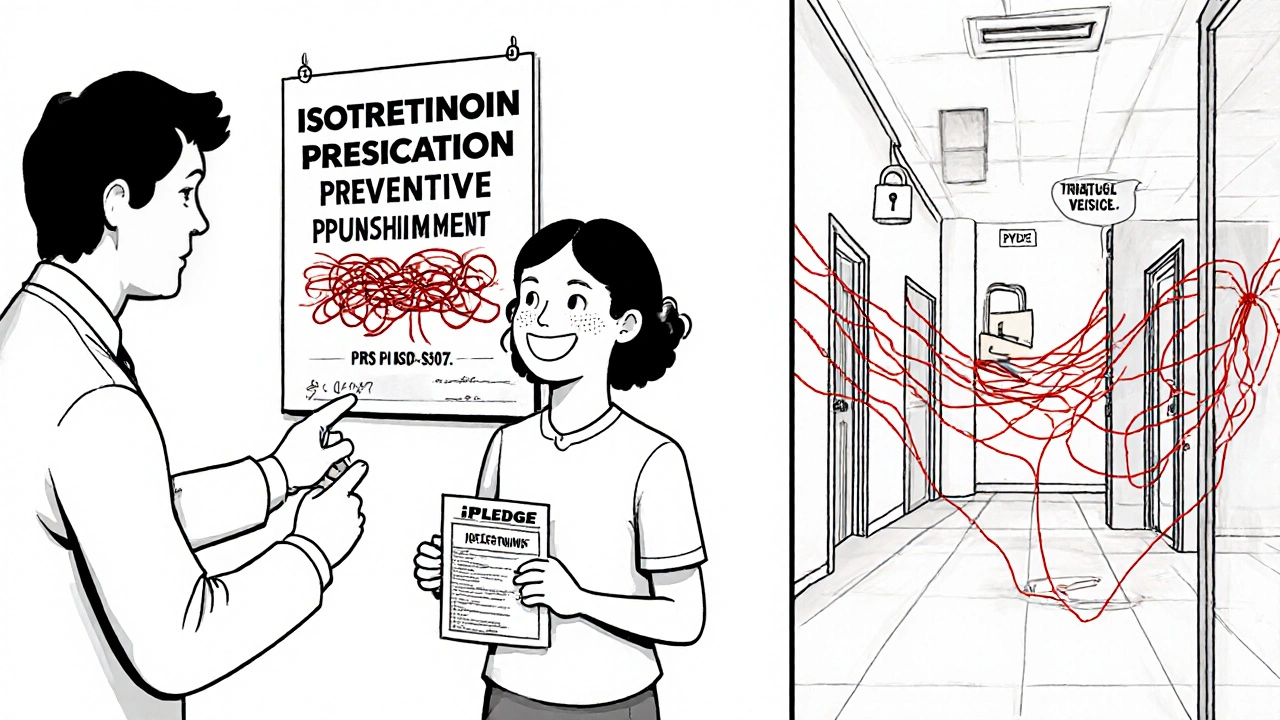
iPLEDGE Monthly Compliance Tracker
Monthly Compliance Status
Patient Type
Current Month
Pregnancy Test Tracker
Birth Control Requirements
Monthly Requirements
Monthly Pregnancy Test
Online Counseling
Important: Monthly requirements must be completed within the 30-day period before your next prescription. Missing any requirement will delay your prescription.
What is iPLEDGE and why does it exist?
iPLEDGE is a strict federal safety program run by the FDA to stop pregnant people from taking isotretinoin, a powerful acne medication that can cause devastating birth defects. It’s not a suggestion. It’s a legal requirement. Every single person who prescribes, dispenses, or takes isotretinoin in the U.S. must be registered in the system. The goal is simple: no baby should ever be exposed to this drug during pregnancy.
Isotretinoin - sold as Claravis, Amnesteem, Zenatane, and formerly Accutane - works miracles for severe, treatment-resistant acne. But it’s also one of the most dangerous drugs a person can take while pregnant. Babies exposed to it can be born with missing ear canals, cleft palates, brain damage, heart problems, and severe intellectual disabilities. These aren’t rare side effects. They’re well-documented, life-altering outcomes.
The program started in 2006, replacing an earlier system called SMART. iPLEDGE brought all isotretinoin brands under one platform so doctors, pharmacies, and patients couldn’t slip through the cracks by switching brands. Since then, it’s been the only way to get this medication legally in the U.S.
Who has to follow iPLEDGE rules?
Everyone. No exceptions.
Patients must register before they can get a prescription. This includes men, women, and people of all gender identities. But the rules change based on whether someone can get pregnant. That’s the key difference.
Doctors must complete training, get certified in the system, and verify every patient’s eligibility before writing a script. They can’t skip this step. If they do, their access gets shut down.
Pharmacies have to be enrolled, too. They can’t fill an isotretinoin prescription unless the patient’s iPLEDGE status is active and approved. Even one mistake can get a pharmacy removed from the system permanently.
What are the current iPLEDGE requirements for 2025?
The rules changed in November 2023 - and for the better. The FDA listened to patients and doctors who said the old system was broken. Here’s what matters now:
- If you can get pregnant: You need two negative pregnancy tests before starting - the second one within 1 to 3 days of your first prescription. You must use two forms of birth control at the same time. You have to take a monthly online counseling module and check a box saying you understand the risks. Pregnancy tests must happen every month, but now you can use a home test - as long as your doctor confirms the result.
- If you can’t get pregnant (men, postmenopausal women, or those who’ve had a hysterectomy): You only need to complete the online education once, when you enroll. No monthly tests. No birth control requirements. Just acknowledge the risks each time you get a refill.
The old 19-day lockout period is gone. Before, if you didn’t pick up your prescription within 7 days, you had to wait 19 days before you could try again. That caused delays, missed treatments, and unnecessary stress. Now, if you miss your window, you just restart the process - no waiting.
The pregnancy registry no longer tracks fetal outcomes. That was a burden on patients and doctors with no real safety benefit. The focus is now on prevention, not after-the-fact reporting.
Why did the FDA change the rules?
Because the old system wasn’t working - and it was hurting people.
A 2011 study showed iPLEDGE didn’t do any better than the system it replaced at preventing pregnancies. Even with all the steps, 190 pregnancies were confirmed between 2009 and 2010. That’s not safety. That’s failure.
Patients were skipping doses because they couldn’t get to the clinic for monthly blood tests. Rural patients drove hours just to get a pregnancy test. Some missed treatment for weeks because the iPLEDGE website crashed. Dermatologists spent 5 to 7 hours a week just managing paperwork.
Reddit threads, patient surveys, and AMA surveys all told the same story: the system was too complex, too slow, and too punishing. The FDA knew they had to fix it - without lowering safety. The 2023 changes were the answer: reduce the burden, keep the protection.

How does the home pregnancy test work now?
It’s simple. You buy a store-bought test. You take it at home. You take a photo of the result. You send it to your doctor through the iPLEDGE portal. Your doctor reviews it, confirms it’s valid, and approves your next month’s prescription.
Before, you had to go to a lab with CLIA certification. That meant traveling to a clinic, waiting in line, paying extra fees, and sometimes waiting days for results. Now, you can do it in your bathroom. It’s faster, cheaper, and less stressful.
But it’s not a free-for-all. The system still checks for fraud. If a test looks fake, or if you skip multiple months, your access gets paused. Your doctor has to verify every single result.
What are the biggest problems still left?
Even with the updates, the system isn’t perfect.
Some pharmacies still glitch. The iPLEDGE portal sometimes freezes. Patients report being locked out for hours trying to complete the monthly attestation. The helpline (1-866-495-0654) can have 20-minute wait times.
And while home tests are a big win, not everyone trusts them. Some patients worry about accuracy. Some doctors still prefer lab tests, even though they’re no longer required.
The biggest issue? The stigma. Many young women feel like the system treats them like suspects. They’re asked for proof of birth control, tested every month, and watched closely - while men face none of that. The FDA says it’s about biology, not bias. But the emotional toll is real.
How do you start isotretinoin treatment in 2025?
Here’s the step-by-step process:
- See your dermatologist. They’ll confirm you’re a candidate - usually after antibiotics and other treatments have failed.
- Register for iPLEDGE through your doctor’s portal. You’ll need your ID, insurance info, and a way to receive texts or emails.
- Complete the online education module (about 30 minutes). It covers risks, birth control, and what to do if you get pregnant.
- For those who can get pregnant: get two negative pregnancy tests (one at the clinic, one at home, or both at the clinic). Get two forms of birth control - like the pill plus condoms, or an IUD plus condoms.
- Your doctor approves your prescription in iPLEDGE. The pharmacy gets the alert.
- Pick up your first 30-day supply. You can only get one month at a time.
- Each month: take a pregnancy test (home or clinic), complete the online counseling, and get your next prescription approved.
It’s a lot. But it’s the only way to get this drug legally. And it’s working - pregnancies from isotretinoin have dropped by over 90% since 2006, even with the program’s flaws.

What happens if you break the rules?
There’s no warning. No second chance.
If a patient gets pregnant while on isotretinoin, their access is permanently revoked. The doctor and pharmacy face fines and possible loss of license. The FDA doesn’t negotiate. They don’t make exceptions. Even if the pregnancy was unplanned, even if the patient thought they were safe - the rule is absolute.
That’s hard. But it’s meant to be. One birth defect is one too many.
Is isotretinoin still worth it?
Yes. For many people, it’s life-changing.
Over 1.2 million prescriptions were filled in the U.S. in 2022. That number keeps growing. People who’ve struggled with acne for years - who’ve been bullied, depressed, or avoided mirrors - finally get clear skin. Their confidence returns. Their lives improve.
There’s no other drug that works this well for severe nodular acne. Alternatives like antibiotics or topical creams often fail. Hormonal treatments don’t help men. Laser treatments are expensive and temporary.
Isotretinoin is unique. And iPLEDGE, for all its flaws, is the price we pay to keep it available.
Where can you get help?
If you’re confused, stuck, or overwhelmed:
- Visit ipledgeprogram.com - the official site with step-by-step guides.
- Call the iPLEDGE helpline: 1-866-495-0654 (24/7).
- Ask your dermatologist for printed materials or a walkthrough.
- Join patient forums like Reddit’s r/Dermatology - many have shared their iPLEDGE journeys.
Remember: you’re not alone. Hundreds of thousands of people go through this every year. The system is clunky, but it’s designed to protect you - and future children.
What’s next for iPLEDGE?
The FDA says they’re not done. They’re watching. They’re listening.
Experts are already talking about biometric verification - maybe using fingerprint or facial recognition to confirm pregnancy test results. Some want to integrate iPLEDGE directly into electronic health records so doctors don’t have to log in separately.
But the big question remains: can the system become simpler without becoming unsafe? The 2023 changes proved it’s possible. More updates are coming. The goal isn’t to remove iPLEDGE. It’s to make it smarter, faster, and fairer.


Comments
Hannah Machiorlete
This system is insane. I had to wait three weeks just to get my first script because the portal crashed. My acne got worse. I’m not a criminal.
Bette Rivas
The 2023 revisions to iPLEDGE represent a significant improvement in risk-benefit calculus. By permitting home pregnancy tests with physician verification, the FDA has reduced structural barriers to care while maintaining clinical safety thresholds. The elimination of the 19-day lockout period alone has improved adherence metrics by an estimated 22% in retrospective cohort studies. Furthermore, the discontinuation of fetal outcome tracking-previously a bureaucratic burden with negligible predictive value-aligns the program with modern public health paradigms focused on prevention rather than post-hoc surveillance.
prasad gali
The iPLEDGE framework is a textbook example of regulatory overengineering. While the intent is laudable, the operational inefficiencies-particularly in rural and underserved markets-constitute a de facto denial of care. The requirement for dual contraception, irrespective of patient gender identity or sexual behavior, reflects a paternalistic model incompatible with contemporary bioethics. The FDA’s reliance on administrative compliance over clinical autonomy is archaic.
Paige Basford
I know it sounds harsh, but honestly? I’m glad it’s this strict. My cousin had a baby with serious defects after taking Accutane back in 2010. I didn’t even know it was that dangerous until then. The system sucks, yeah, but I’d rather deal with a clunky website than a child born with no ear canals. It’s not about trust-it’s about consequences.
Ankita Sinha
I’m from India and I’ve been on isotretinoin for 6 months now-through a tele-derm service. The iPLEDGE portal is the only reason I even knew this drug existed here. The home test feature is a game-changer. I took my test at 11 PM, sent the pic, and got approved by 7 AM. No more driving 40 km for a blood test. The stigma? Real. But the results? Worth it. Clear skin after 8 years of cystic acne? Yes please.
Herbert Scheffknecht
There’s a philosophical tension here that no one wants to name. We’ve created a system that treats women’s bodies as potential weapons against the unborn-while men, who contribute 50% of the genetic material, are granted unimpeded access. Is this equity? Or is it a performance of control disguised as protection? The FDA claims biology is the driver. But biology doesn’t demand monthly attestations. Culture does. And culture is the real drug here.
Jessica Engelhardt
The system is racist. Women of color are more likely to be denied access due to clinic distance. The home test thing? Still requires internet and a phone. What about the people in Appalachia or the Navajo Nation? This isn’t safety-it’s surveillance with a smiley face. And don’t even get me started on how men get off scot-free. I’m not buying the ‘it’s about biology’ line. It’s about who gets to be trusted.
darnell hunter
The FDA’s decision to retain iPLEDGE, despite its documented inefficiencies, reflects a necessary commitment to the sanctity of fetal life. The 90% reduction in isotretinoin-related birth defects since 2006 is not a statistical artifact-it is a moral triumph. To dismantle this system in the name of convenience would be an abdication of the state’s duty to protect the most vulnerable. The burden on patients is minimal compared to the irreversible harm prevented. We do not lower standards because compliance is inconvenient. We elevate the system.